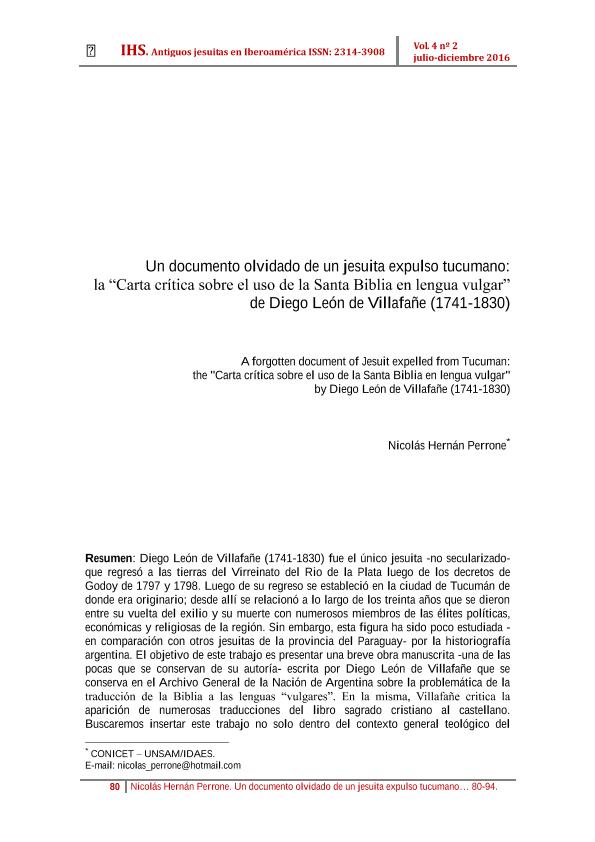Artículo
Diego León de Villafañe (1741-1830) fue el único jesuita -no secularizadoque regresó a las tierras del Virreinato del Rio de la Plata luego de los decretos de Godoy de 1797 y 1798. Luego de su regreso se estableció en la ciudad de Tucumán de donde era originario; desde allí se relacionó a lo largo de los treinta años que se dieron entre su vuelta del exilio y su muerte con numerosos miembros de las élites políticas, económicas y religiosas de la región. Sin embargo, esta figura ha sido poco estudiada - en comparación con otros jesuitas de la provincia del Paraguay- por la historiografía argentina. El objetivo de este trabajo es presentar una breve obra manuscrita -una de las pocas que se conservan de su autoría- escrita por Diego León de Villafañe que se conserva en el Archivo General de la Nación de Argentina sobre la problemática de la traducción de la Biblia a las lenguas “vulgares”. En la misma, Villafañe critica la aparición de numerosas traducciones del libro sagrado cristiano al castellano. Buscaremos insertar este trabajo no solo dentro del contexto general teológico del antijansenismo europeo, sino también dentro de los debates religiosos que se dieron en el Rio de la Plata entre finales del siglo XVIII y comienzos del siglo XIX. Diego León de Villafañe (1741-1830) was the only non-secularized Jesuit who returned to the lands of the Viceroyalty of Rio de la Plata after the decrees of Godoy of 1797 and 1798. After his return he settled in the city of Tucumán where he was born; from there he stablished -throughout the thirty years between his return from exile and his death- numerous relations with members of the political, economic and religious elites of the region. However, this figure has been mostly negleted by the argentinian historiography. The objective of this work is to present a brief manuscript work -one of the few that remain of its authorship- written by Diego León de Villafañe preserved in the Archivo General de la Nación of Argentina on the problematic of the translation of the Bible to the "vulgar" languages. In his work Villafañe criticizes the appearance of numerous translations of the Christian holy book into Castilian. We will try to insert this work not only within the general theological context of anti-Jansenistic thought in Europe, but also within the religious debates that took place in the Rio de la Plata between the end of the eighteenth century and the beginning of the nineteenth century.
Un documento olvidado de un jesuita expulso tucumano: la “Carta crítica sobre el uso de la Santa Biblia en lengua vulgar” de Diego León de Villafañe (1741-1830)
Título:
A forgotten document of Jesuit expelled from Tucuman: the "Carta crítica sobre el uso de la Santa Biblia en lengua vulgar" by Diego León de Villafañe (1741-1830)
Fecha de publicación:
12/2016
Editorial:
Consejo Nacional de Investigaciones Científicas y Técnicas. Centro de Investigaciones y Estudios sobre Cultura y Sociedad
Revista:
Antiguos Jesuitas en Iberoamérica
e-ISSN:
2314-3908
Idioma:
Español
Tipo de recurso:
Artículo publicado
Clasificación temática:
Resumen
Palabras clave:
DIEGO LEÓN DE VILLAFAÑE
,
TRADUCCIÓN
,
BIBLIA
,
ANTI JANSENISMO
Archivos asociados
Licencia
Identificadores
Colecciones
Articulos(SEDE CENTRAL)
Articulos de SEDE CENTRAL
Articulos de SEDE CENTRAL
Citación
Perrone, Nicolás Hernán; Un documento olvidado de un jesuita expulso tucumano: la “Carta crítica sobre el uso de la Santa Biblia en lengua vulgar” de Diego León de Villafañe (1741-1830); Consejo Nacional de Investigaciones Científicas y Técnicas. Centro de Investigaciones y Estudios sobre Cultura y Sociedad; Antiguos Jesuitas en Iberoamérica; 4; 2; 12-2016; 80-94
Compartir
Altmétricas




